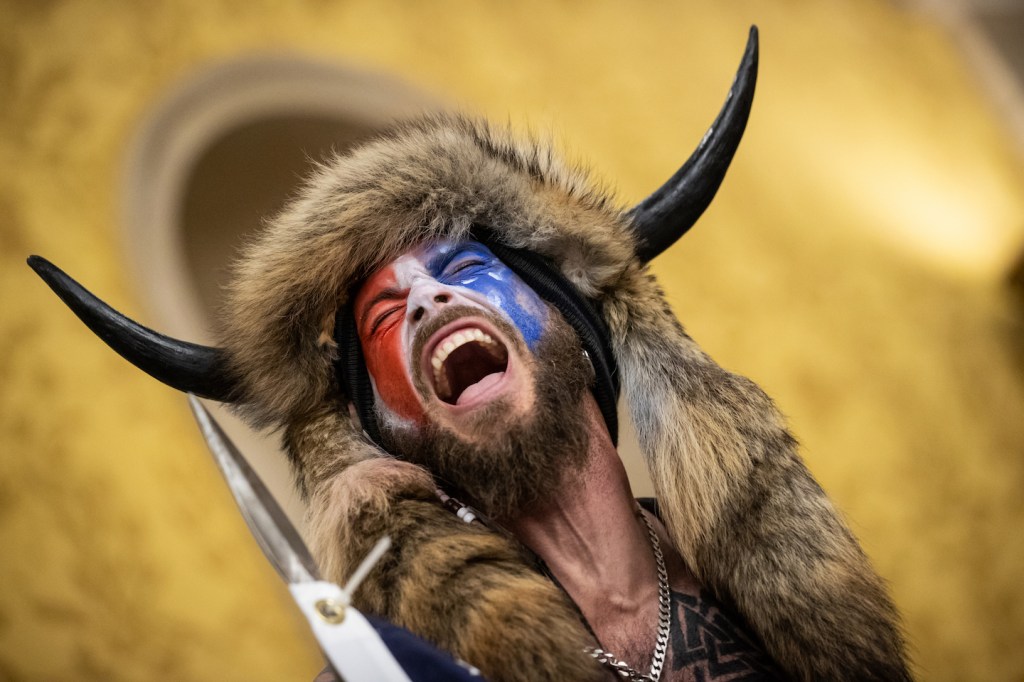Georgia Congresswoman Marjorie Taylor Greene has said the Sandy Hook school shooting was fake and that Hillary Clinton tortured and murdered a young girl before drinking her blood, and she once liked a Facebook post that called for the execution of Nancy Pelosi.
But Washington State GOP operative Donnie Hall sees Greene not as someone to be shunned but rather as someone who’s simply misunderstood.
Videos by VICE
“I feel a certain empathy towards her because some of [the statements] she makes are outlandish, for the sake of being outlandish. But if you really dissect them, they’re not all that, you know, over the top,” Hall said in the latest episode of VICE News Reports.
Hall is a member of the Clallam County Republicans Executive Board, and he’s responsible for deciding which local candidates should get GOP support. He is also co-founder of the Independent Advisory Association, a group that trains “populist-conservative” candidates for public office across the county.
As others in his party reject conspiracy-fueled outbursts from Greene and others like her, Hall sees “energy” around QAnon as something to be leveraged for political gain. That’s why he backed a QAnon supporter running for office in the small town of Sequim, Washington—and the man won.
And he likely won’t be the last.
Hall, who spent over three decades working for the Department of Defense and the Navy, retired 10 years ago, and moved to Sequim (pronounced Skwim), a small town of 7,000 residents on Washington State’s Olympic Peninsula.
In 2019, he saw an opportunity in the form of a proposal to build a new opioid addiction treatment facility on the edge of town. Opposition to the facility—which is badly needed in a county with a rampant opioid crisis—coalesced around a Facebook group called Save Our Sequim, that now has 2,500 members, around a third of the town.
The group quickly descended into conspiratorial conversations, with members blaming shadowy outsiders for trying to destroy the town. These then spiraled into claims that the clinic would attract not only homeless people but also human traffickers, a key part of the QAnon conspiracy.
QAnon is a loose series of outlandish conspiracy theories that centers on the belief that a group of Democrats and Hollywood elites are running a child sex trafficking ring that former President Donald Trump is secretly working to bring down.
But rather than shying away from the fringe beliefs, Hall thought the local Republican Party should embrace them. “I liked the energy,” Hall told VICE News Reports. “I like the idea that people are awake and paying attention and feel like they need to assert their voice. I don’t like the idea that it does permit an opportunity for craziness.”
One member of the group was William Armacost, a local salon owner with QAnon beliefs. Hall approached him about running for office, deciding to use him as a “guinea pig” to see if he could get this new type of candidate elected mayor.
It worked.
As mayor, Armacost made national headlines last year for his open support of QAnon. He told a local radio station last August that QAnon was a “truth movement that encourages you to think for yourself.”
The town of Sequim, and the nearby town of Forks, also made headlines last summer when locals became convinced that “antifa” was coming to do violence, which ultimately culminated with people with guns trapping a multiracial family on a rural road.
The people who follow QAnon are not a homogenous group. There are hardcore supporters who closely watch every development and make interpretations based on their own “research.” And then there are people who don’t even consider themselves QAnon followers but believe in the core conspiracies espoused by the movement.
Hall says that the more fanatical aspects of QAnon should not be encouraged, but he sees no problem with accepting a candidate who says they believe in some of QAnon’s conspiracies. In fact, he welcomes it, provided they’re not too extreme.
“Would we be willing to work with someone who exposed himself to QAnon materials? Absolutely. The first word in our title is Independent. A willingness to look into sources other than Fox News, CNN, MSNBC would be a statement of independence just by itself,” Hall said. “Would we be willing to work with a QAnon fanatic? Absolutely not. Fanatics and ideologues are not electable as independent citizen candidates.”
Hall himself refers to a number of popular GOP conspiracy theories during his interview, including the claim that the U.S. presidential election was stolen. When asked if the results were legitimate, Hall said he didn’t know, even though officials have repeatedly said there is no evidence of widespread voter fraud. He also speaks about the “elites” who hold too much power in the town, a common trope both in GOP rhetoric and QAnon circles that believe that the “elites” are running a Satanic, cannibalistic pedophile ring.
It is unclear to what extent Hall believes in other more extreme QAnon theories.
Some Republicans have disavowed QAnon. But there is a large section of the GOP that appears happy to let the conspiracy theorists play a growing role inside the party, even though they may not openly advocate for it. There was a significant QAnon presence at the Conservative Political Action Conference (CPAC) last weekend.
And the person most responsible for the mainstreaming of QAnon is Trump, who has repeatedly failed to disavow the conspiracy movement.
And as for Marjorie Taylor Greene, Hall has some advice.
“When she said what she said about the Jewish space lasers starting the forest fires, I said ‘Oh, jeez, what are you up to?’ but if she said something like Israeli space lasers I would’ve said, ‘Yeah, OK’, because who knows what Israel is up to in space.”





